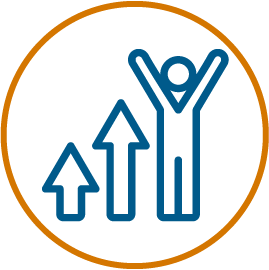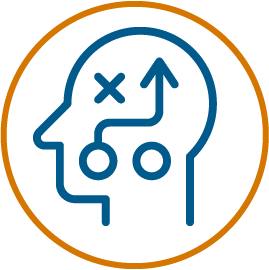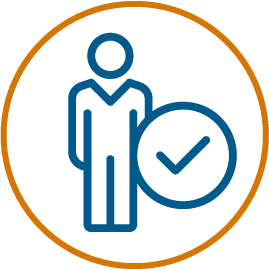Prepare for a career as a clinical or vocational rehabilitation counselor, helping people with disabilities to lead more independent lives.
Program Type
Master's
Semester Start
Fall, Spring, Summer
Study Options
Online
Minimum Duration
2 Years
UMass Boston’s Rehabilitation Counseling MS is designed for people interested in pursuing an advanced degree and national certification as a rehabilitation counselor, as well as partial requirements for state licensure as a rehabilitation counselor and/or mental health counselor. Rehabilitation counselors support people with disabilities to lead productive and fulfilling lives, including working at integrated and competitive jobs in their communities.
Our 60-credit program develops professionals to advance educational access and economic and social participation for individuals with disabilities. Courses are primarily online, although it is possible to take some courses on campus. Classes typically convene online for an hour once a week during the semester. Recognizing the busy lives of our students, the program is designed to be flexible and convenient, offering interactive online class meetings after regular hours.
The program commences with a one-week residential session in Boston, providing an opportunity to familiarize yourself with your program cohort and professors. Our student body hails from across the country, representing a diverse range of backgrounds and ages. Throughout the program, you will integrate classroom content with real-world, hands-on experience through supervised fieldwork.
UMass Boston’s Rehabilitation Counseling MS consists of two tracks: Clinical Rehabilitation Counseling and Vocational Rehabilitation Counseling. Both tracks in rehabilitation counseling are fully accredited by the Council for Accreditation of Counseling and Related Educational Programs (CACREP).
At the end of the program, you will be eligible to sit for the Certified Rehabilitation Counselor exam to receive your credential as a nationally-certified rehabilitation counselor. Students in the clinical track will have fulfilled the pre-master's requirements for Massachusetts state licensure as either a rehabilitation and/or mental health counselor. (Counselor licensing requirements differ across states, applicants should review licensing requirements in the state in which they reside).
UMass Boston’s School for Global Inclusion and Social Development is home to the highest-rated rehabilitation counseling program in New England and 15th best nationally (U.S. News & World Report). Ranked as one of the Best Online Graduate Education Programs by U.S. News & World Report. And Ranked as one of the Best Online Graduate Education Programs for Veterans by U.S. News & World Report.
Mission Statement
The mission of the Rehabilitation Counseling program at UMass Boston is to recruit, educate, and graduate diverse students to be competent rehabilitation counselors with the knowledge, skills, and dispositional standards required according to our professional certification. Rehabilitation counselors support and empower persons with a range of disabilities, including physical, mental, emotional, educational, and developmental disabilities, to participate fully in society. Our rehabilitation counseling graduates are prepared to work in a wide range of rehabilitation settings, including vocational rehabilitation, mental health, education, advocacy, independent living, and other settings that support the well-being of individuals with disabilities. We believe in the value and worth of all individuals, the right of all persons to self-determination, and that the attitudinal and environmental barriers faced by people with disabilities are fundamental obstacles to full inclusion that must be acknowledged and addressed.
In carrying out this mission, the faculty has an obligation to:
- Create a culture of intellectual excellence that is supportive of a diverse range of students.
- Promote social justice through their teaching, research, and service,
- Maintain a curriculum that incorporates evidence-based and best practices from the field and thoroughly covers all knowledge domains specified by CACREP, and
- Pursue grants that will further this mission.
Tuition
- This program consists of seventeen 3-credit courses, two 4-credit courses, and one 1-credit course, or 60 credits.
- Online tuition is $575 per credit.
- Total estimated tuition cost to complete this program is $0 - $34,500.*
- *This program has scholarships available for students. Approximately 75% of students receive a scholarship that pays for 75% - 100% of tuition. Students who receive the scholarship are required to work in the field for 2 years for each year that they received tuition support.
- Total estimated tuition cost to complete this program is $0 - $34,500.*
- Estimate is based on completing program by minimum duration. Other fees may apply. Request Info to connect with a program representative for further details.
- The program offers a number of Rehabilitation Services Administration scholarships and graduate assistantships.
Deadlines
- Application deadline for summer semester is April 1.
- Application deadline for fall semester is July 1.
- Application deadline for spring semester is November 1.
Applications are considered on a revolving basis after that time.
Application Checklist
- Online Application
- Transcripts — Official transcripts from all undergraduate and graduate institutions attended. A 3.0 undergraduate GPA is required.
- Three Letters of Recommendation — Use the forms provided by the Office of Graduate Admissions. Emphasis should be on academic and professional references.
- Test Scores: GRE or MAT — We are no longer requiring GRE or MAT scores for admissions.
- Statement of Interest and Intent (Required Writing Sample) — Submit a two-part essay:
- Explain your reasons for wishing to pursue graduate studies (approximately 300 words).
- Indicate your specific interest in rehabilitation counseling and discuss the type of work you would like to do in this field (at least 1,200 words).
- This statement will be reviewed for both your overall message and your ability to write at the graduate level. Proofread your writing carefully; it is ranked according to its clarity, grammar, and syntax.
- Résumé or Curriculum Vitae — Please make sure all educational background and professional history is current with degrees earned, institutions attended, majors, and GPAs.
- Personal Interview with Faculty Member — When the Office of Graduate Admissions has notified us of your completed application, we will contact qualified candidates to arrange an interview (either in person or via teleconference).
- International Applicants Only — TOEFL Test Scores
1. Required Courses:
- Research and Evaluation in Psychology (COUNSL 601)
Explore several research models and strategies with respect to their various rationales and methodologies. You’ll learn relevant statistical topics as they are introduced conceptually, and especially as they are applied in research about specific academic settings. - Principles of Vocational, Educational, and Psychological Assessment (COUNSL 605)
The course provides you with a survey of standardized tests used in assessing aptitudes, interests, and personality traits. You’ll learn technical and methodological principles and social, ethical, and legal implications of psychological testing and assessment. - Vocational Development and Career Information (COUNSL 613)
Study the theories of Roe, Holland, Ginzberg, Super, and Tiedeman in the vocational development component of this course. Locate and use sources of educational-vocational information in the career information component of the course. These sources will include, but not be limited to, the Dictionary of Occupational Titles, the Occupational Outlook Handbook, the Guide to Occupational Exploration, information on local labor markets and on military careers, occupation-education information, college and vocational school guides, and catalogues. - Group Counseling and Group Dynamics (COUNSL 616)
Get an introduction to group dynamics using the group process of the class to provide experience of group membership and data for interpretation. Participate as a group member and use readings and lectures to build a cognitive base for evaluating experiential learning. - Life Span Human Development (COUNSL 620)
Get a comprehensive view of lifespan development from childhood through adulthood from several perspectives: 1) the interaction of age with such factors as gender, cultural background, disabilities, and other significant issues encountered at particular stages of life; 2) how individuals at specific stages of cognitive development process information and experience; and 3) a structural approach to ego development. - Sociocultural Considerations in Counseling (COUNSL 653)
Study the role of culture in counseling and psychology by looking both at history and current issues. You’ll use an interdisciplinary framework to approach the question of counseling in a multicultural society. This course seeks to contribute to both the personal and the professional development of its participants. - Medical, Psychological, & Educational Aspects of Disabilities (REHAB 602)
The course is designed to offer students with little or no exposure to advanced life sciences the opportunity to examine the physiological and anatomical basis for many chronic diseases they will encounter in a rehabilitation counseling setting. You’ll examine the etiology, progress, and potential resolution of a wide range of disorders, as well as the potential implications consequent on these disabilities. - Foundations of Rehabilitation (REHAB 603)
Learn basic information about the process of rehabilitation and its history and philosophy. Discussions focus on the organizational structure of the rehabilitation system, the professional identity of the rehabilitation counselor, and legal and ethical issues in the practice of rehabilitation counseling. - Case Management and Planning in Rehabilitation (REHAB 610)
Explore case management in rehabilitation counseling and with the range of community resources available to the counselor whose goal is the effective and comprehensive rehabilitation of individuals with disabilities. You’ll learn about case finding and case planning, service coordination, and client advocacy activities. - Vocational Rehabilitation and Placement (REHAB 612)
Learn about the total vocational rehabilitation process, including follow-up services. You’ll explore topics including the referral process, eligibility criteria, comprehensive (medical, psychological, vocational) assessment, vocational training, and placement. - Practicum (REHAB 688)
The purpose of the practicum is to expose you to your particular field in counseling through actual placement in a facility where appropriate supervision is provided. Class discussions include a review onsite observations and experiences and discussions of current issues in the field. - Internship (REHAB 698) (2 semesters)
The purpose of the internship course is to provide you with actual work experiences. The internship consists of supervised field experience in a rehabilitation setting, such as a hospital, a state agency, a community agency, or a private company. Additionally, you’re required to attend a weekly seminar at the University conducted by the instructor. The focus of the on-campus seminar is to review and critique students’ implementation of rehabilitation counseling theory and practice, to provide a forum for students to discuss issues arising at internship sites, and to help each other with insights and emotional support. - Motivational Interviewing (REHAB 614)
Gain an understanding of the basic skills of counseling related to active listening and accurate empathy. You’ll learn the foundation of the theory and practice of motivational interviewing as an evidence-based practice in the rehabilitation counseling profession. Professional ethical sociocultural issues in the client/counselor relationship will be discussed. Lecture, role play, and audio will be used to augment your understanding of the process of change. - Counseling Theories (REHAB 615)
Explore the range of different counseling theories and their application to different situations and needs of different individuals. You’ll learn the theory behind the counseling approach and will have the opportunity to practice the different approaches. Role-playing will be used to demonstrate different concepts. Throughout the class, you’ll begin to develop your personal approach toward counseling and will discuss how to integrate the different theories into their counseling. You will also learn how to integrate these theories into practice in developing a therapeutic relationship and in supporting individuals in crisis. - Rehabilitation Counseling Portfolio (REHAB 611)
This course meets once per month during the fall semester and during the first year in which you’re enrolled in the program. Each class meeting will focus on the various topics relevant to portfolio and professional development in Rehabilitation Counseling, including: 1) Course overview and an introduction to Taskstream as an e-Portfolio tool, 2) Professional credentialing in rehabilitation counseling (licensure and certification, 3) Field placement opportunities in rehabilitation counseling (practicum and internship), and 4) Professional identity of self-marketing in rehabilitation counseling and career planning.
2. Tracks: Choose one track to specialize in:
Clinical Rehabilitation Counseling Track
Required Courses:
- Psychopathology and Diagnosis (COUNSL 608)
Explore information relevant to the diagnosis, etiology, and treatment of mental illness. You’ll learn about psychopharmacological interventions are addressed, epistemological assumptions that ground traditional theories of psychopathology and diagnostic systems such as the DSM, and avoiding bias in psychiatric diagnosis is a major focus of the course. Throughout the course, you’ll study the following DSM categories: mood disorders, anxiety disorders, psychotic disorders including schizophrenias, disorders usually first evident in childhood, and personality disorders. - Psychopharmacology for Counselors (COUNSL 674)
Examine psychopharmacology for counselors from a social justice perspective. Get an overview of the medications used for treating mental disorders and learn the basic principles of pharmacology and the interrelationships between pharmacokinetics and pharmacodynamics with an emphasis on practical and clinical application. You’ll explore the nature of alcohol and narcotics and the ways they affect addicts in mind and body before, during, and after treatment, as well as psychopharmacological treatment for addictions; informed consent; how to find accurate and balanced information about the efficacy and side effects of psychotropic medications; how to educate clients about the medications they are taking; and how to collaborate with prescribing providers and other mental health professionals. You’ll become conversant with regulatory standards for the approval of new medications. Social justice and bioethical issues figure predominately in this course with reference to for-profit IRB's; recruitment of marginalized groups, such as undocumented immigrants, the homeless, and people living in poverty, and discrepancies in prescription practices. - Psychiatric Rehabilitation (REHAB 609)
Through this course you’ll (1) begin to work with individuals who have mental illness; (2) collaborate effectively within the community ''network of care”, and (3) comprehend the experience of mental illness from a variety of perspectives. You’ll build skills and knowledge in an array of areas including supported employment, social skills training, Wellness Recovery Action Plan (WRAP) development, co-occurring disorders, Assertive Community Treatment (ACT), and related modalities.
Elective (Pick One):
Choose one 3-credit elective from the School for Global Inclusion and Social Development or the College of Education and Human Development (e.g., substance abuse, transition leadership, vision studies, global inclusion and social development, study abroad), or other approved graduate courses from other UMass Boston schools or colleges.
Vocational Rehabilitation Counseling Track
Electives (Pick Four):
Choose four 3-credit electives from the School for Global Inclusion and Social Development or the College of Education and Human Development (e.g., substance abuse, transition leadership, vision studies, global inclusion and social development, study abroad), or other approved graduate courses from other UMass Boston schools or colleges.
At the end of this two-year program, you’ll be awarded a Master of Science in Rehabilitation Counseling. The degree will demonstrate your expertise in the field on your résumé, as well as in interviews and workplace evaluations. At the end of the program, you will be ready to sit for the Certified Rehabilitation Counselor exam and if you have completed the clinical track can apply for state licensure as a mental health counselor.
- Pass rate for the CRC exam for UMass students 2018 -2019: 80%
- National pass rate for CRC exam 2018-2019: 53%
- Graduates that find employment as rehabilitation counselors: 95%
UMass Boston programs are designed to meet the requirements for licensure or certification in Massachusetts. Please contact your state licensing or certification board to determine whether a program meets the requirements for licensure or certification in other states. You may also contact us with any questions.
Why UMass Boston Online?
Value
Among the lowest online tuition rates of an accredited, public research university.
Flexibility
Study full-time to finish fast, or part-time to suit your schedule. Live sessions scheduled with the working professional in mind.
Authenticity
The same courses taught by the same academic departments as on campus. No third-party providers.
Learn More






